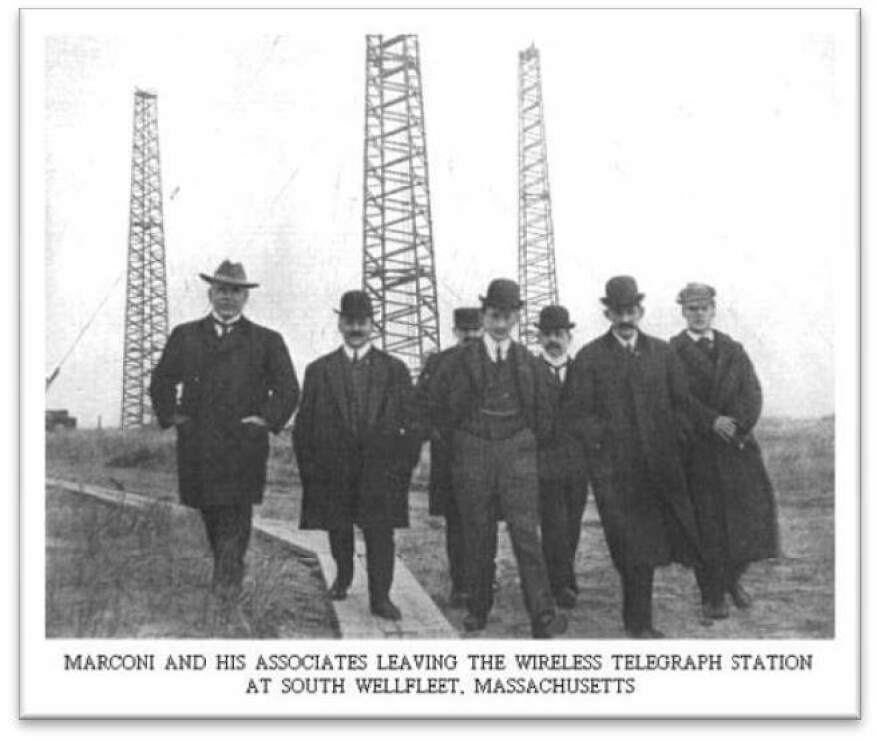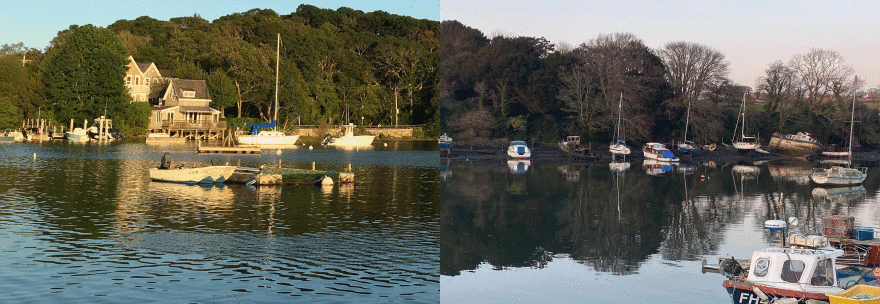What we’re doing
Our two radio stations are collaborating on producing hour-long programs of conversations from one community to the other. On Cape Cod, USA, CAI is the local public radio station for the region, located in the town of Falmouth. In Cornwall, UK, SourceFM is a community radio station staffed primarily by volunteers. It, too, is located in the town of Falmouth.
Of course, each station serves a wider community: the Falmouths represent our studio locations, but our radio signals travel across coastlines and islands.
The communities we serve share specific challenges: coastal environmental impacts from climate change; big problems with affordable housing as our tourist-friendly locations are increasingly dominated by short-term rentals; young people moving away for opportunities elsewhere; and many others, as well.
And we also share many positives: we’re areas renowned for natural beauty, with histories of seafaring and farming, and home to energetic, engaged communities.
This new collaboration aims to link our two regions through direct conversations between residents on both sides of the ocean.
And we’re looking for suggestions! Want to join the conversation? Know someone you think we should speak with? Send us an email.

‘Beyond scary’: With little guidance and few resources, neighborhood grocers navigated the pandemic’s worst

Providing essential food to communities in lock down. Fearing for the safety of their own staff. Facing unexpected and inexplicable shortages in basic stuffs like toilet paper and flour.
Local grocers became unlikely frontline workers in the early days of the pandemic.
On the island of Martha’s Vineyard, just a few miles offshore of Cape Cod, Cronig’s Market has been serving the community as an independent grocer for more than 100 years. Owner Steve Bernier has been working in retail food for 57 years. But the first month of the pandemic was unlike anything he’d ever experienced. “When this hit us," he says, "the unknown absolutely blew our mind and scared the daylights out of us.”
In the village of Mylor Bridge, Cornwall, Mylor Stores turned to volunteers to keep the community fed through the early days of the pandemic. Chris Henderson, an employee, says volunteers were critical for collecting orders and delivering groceries. “We have a lot of elderly people in our village, and we were worried about those people not being able to get their food because they were told to not go outside for 13 weeks. They had to stay in and self-isolate,” Henderson explains. “And of course, we then were inundated with phone calls of elderly people saying, ‘How are we going to get food?’”
In the first segment of our program, Chris Henderson and Steve Bernier trade stories of coping in extraordinary times, and of the resiliency of their co-workers and communities.


TAKE THE QUIZ: see the photos and video

‘We don’t have the gift of security’: For young people on a coastline, questions of climate change and environment loom especially large

In school and in the media, young people hear plenty about sea level rise, warming atmospheres, coastal erosion, and environmental degradation. How does that impact their day-to-day lives? And how does it translate into anxiety for their personal future and the future of the place in which they’ve grown up?
Ellie Baxter, 22, was born in Falmouth, UK. She’s a recent university graduate. In our second segment, Baxter speaks with Trinity Poon, a high school senior from the town of Sandwich on Cape Cod.
Poon says it feels like she’s always been aware of the threat of climate change. When she looks at how her parents grew up, they had a kind of security that there would be “beautiful places, there will be clean water, there's going to be clean air. I feel like we don't really have that gift of security of environment, which kind of upends everything you thought you could have in the future. And that's kind of a bleak way to look at it. But I'm not giving up yet.”
Baxter says today’s young people have had to face any number of crises—which makes focusing on just one, like climate change, particularly difficult. “It sounds bad to say it, but everyone's got so much to think about, especially being in a pandemic. Like, it's been hard to get jobs. It's taken a big toll on people's mental health, this pandemic,” she says. “It's hard. It's hard being young in the world right now with all of this going on. It's very scary.”
And yet they both feel hopeful that the environmental problems can be addressed. Says Poon, “I think when we're put in this situation in which we need to do something, when there's definitive action that needs to be taken and there's a pressing issue, we figure it out. We've always figured it out, one way or another.”

From Cornwall to Cape Cod, we are the radio children of Marconi

Radio pioneer Guglielmo Marconi first sent signals from Cornwall to Cape Cod in the early 1900s. He built immense antennae towers in Poldhu, Cornwall, and another set of antennae towers in Wellfleet, Cape Cod. Together with a relay station on Nova Scotia, they were used to transmit the first radio messages across the Atlantic.
We’re pretty sure back then they didn’t chat about selling groceries in a pandemic, or climate change anxiety. Or even (see below) sgraffito and moon jar pottery. But in fairness, the technology Marconi needed was pretty intense. The antennae towers were more than 200 feet (61 m) tall. And the radio stations used a Tesla transformer to step up the power to 25,000 volts. Yikes.
To schedule our meetings, we sent emails. Or opened the app on our phone and just started talking.
Nobody tell Marconi!


Sgraffito and moon jar: two potters compare notes on shaping clay, surviving the pandemic, and building community

Both Cornwall and Cape Cod abound with artists and artisans. In our third segment, we introduced two potters… or, er, ceramicists. Or maybe best to call them clay artists.
Both are dedicated to the creation of their own works and to fostering a local community of like-minded artists to carry on these traditions.

Sarah Caruso founded a community studio, Meeting House Clay Center, in the Cape Cod village of Cataumet. As luck would have it, she opened its doors in early 2020, just before the pandemic arrived and shut everything down. She says, eventually, she came to see that timing as a blessing in disguise. After three months she re-opened, with small, socially-distanced classes. “I heard from students that it was kind of a lifeline for them,” she says. “It was the only place that they were going outside of their house. So we kept them from feeling isolated, which made me feel really good, too. And it was pretty much the only place that I was going, to come in and teach and to do studio maintenance. So it was my connection to a small group of other people.”
You can see Sarah Caruso’s clay creations here.
Michel Francois calls himself an ash glaze potter with a fascination for the moon jar form. He has a studio in Falmouth, England, where he sells his work, and he has a home studio on a farm, where he does most of his creating. “It is is a weird, weird profession being a potter,” he says, “because it's more like a journey than a job. You really live it, and you do need to be in isolation, on your own, in order to work. But you also need to connect with others.”
You can see Michel Francois’s clay creations here.
Click hear to listen to Episode 2 in this series

Credits
Program hosts: Eve Zuckoff and Simon Neild
Special production assistance: Jennette Barnes and Eve Zuckoff
Photo montage: Liz Lerner
Engineering: Simon Neild
Music:
"So Complete" (show theme) – Jules Berry
"Come Alive" (second break) – Martha Tilston
Edited by Steve Junker
Web post by Steve Junker
Produced by Steve Junker and Simon Neild
Falmouth to Falmouth is a collaboration between SourceFM in Falmouth, UK and CAI in Falmouth in the USA.
PRESS - Here's some of the news coverage around this program







